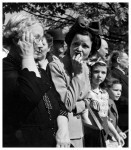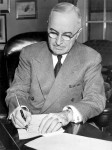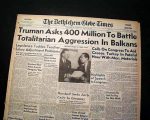
The Truman Doctrine was the United States’ first Cold War policy. The road to the Truman Doctrine began with the April 1945 death of Franklin Roosevelt, who had been US president since January 1933. During his presidency, Roosevelt responded to several great challenges, such as overseeing the reconstruction of the nation after the devastating Great Depression. When World War II erupted in 1939, Roosevelt upheld America’s long-standing commitment to neutrality – but he also supported her allies, particularly Britain, through the development of the lend-lease program. In December 1941, after the American base at Pearl Harbour was attacked by the Japanese, Roosevelt declared it a “date which will live in infamy” and committed American might to the European war. Roosevelt’s leadership was instrumental in vanquishing two great tyrannies: Nazism in Europe and Japanese imperialism in Asia. Sadly, he would not live to see the final defeat of either. Weakened by years of paralysis, smoking and stress, Roosevelt’s own days were numbered. In November 1944 the president was swept back into power for a record fourth term – but he would serve barely four more months. On April 12th 1945, Roosevelt, while resting at his holiday home in Georgia, said “I have a terrific pain in the back of my head” before slumping onto his desk. The pain was a massive stroke and the president never regained consciousness.
On Roosevelt’s death, the presidency passed to Harry S. Truman (the ‘S’ did not stand for another name). Truman had been elected vice-president to Roosevelt the previous November. A veteran of combat in World War I, Truman was a former shopkeeper with comparatively little education (he did not attend school until he was eight and was the only 20th-century president without a college degree). Truman had been a US Senator since 1935; as a senator, he garnered some press attention for heading a committee which cracked down on wasteful spending and corruption in the military. Truman had a reputation as a plain-speaking, no-nonsense politician, someone who got things done. He was relatively inexperienced, however, and many questioned his suitability for the United States presidency. These doubts seemed confirmed by Roosevelt’s practice of not discussing major policies or war tactics with Truman during his 82-day vice-presidency. Truman only learned of the Manhattan Project and the atomic bomb after becoming president; indeed, there is a good chance that Soviet leader Joseph Stalin knew of it before Truman himself.

In July 1945, just three months after taking office, Truman journeyed to Potsdam, Germany for a tripartite meeting with British prime minister Winston Churchill and Stalin. There he faced two difficulties. The first was his own inexperience, both as president and as a foreign policy negotiator. The second was deciding how to handle Stalin and negotiate a post-war relationship. Soviet troops had already occupied much of eastern Europe – including Poland, Latvia, Lithuania, Estonia, Czechoslovakia, Hungary, Bulgaria and Romania – under the pretext of stabilising the region. Truman would write to family members that he enjoyed the company of Stalin – a man who looked him firmly in the eyes when speaking – but that the Russians were, in general, “pig-headed” negotiators who always sought the upper hand. Truman was certainly more suspicious of Stalin’s motives than Roosevelt had been. He viewed the ongoing Russian occupation of eastern Europe as the beginnings of a Soviet empire, an expansionist force that endangered the rest of the continent. To gain the upper hand over Stalin, Truman revealed that the US had a new weapon of “unusual destructive force” – but Stalin showed little interest, having already learned of America’s nuclear program through espionage.
“Truman did not suffer tyrants gladly. In October 1939 he said that ‘three dictators: Russian, German and Italian’ had returned to ‘a code little short of cave-man savagery’ and that he saw their exploitation of ‘this magnificent machine age of ours’ as an effort to destroy civilisation… In June 1941 he made a controversial public remark on the subject of despotic aggression: ‘If we see that Germany is winning we ought to help Russia and if Russia is winning we ought to help Germany, and that way let them kill as many [of each other] as possible’.”
Elizabeth Spalding, historian
Truman spent the two-year period after the war dealing with American domestic economic issues, however, he monitored Soviet encroachment in eastern Europe. An important source of advice on Soviet Russia was the United States embassy in Moscow. In February 1946 the deputy ambassador, George Kennan, sent a lengthy telegram to the US Treasury Department, summarising his view of the USSR, its government, ideology and objectives. This ‘Long Telegram‘, as it became known, would shape American attitudes and policy during the Cold War. Kennan argued that the Soviet Union was hell-bent on the destruction of capitalism. Moscow would seize any opportunity to advance communism in countries that were weak, politically unstable or recovering from the ravages of war. Of the struggle between Western capitalism and Soviet communism, Kennan noted that:
“Much depends on health and vigor of our own society. World communism is like a malignant parasite which feeds only on diseased tissue. This is point at which domestic and foreign policies meets… every courageous and incisive measure to solve internal problems of our own society, to improve self-confidence, discipline, morale and community spirit of our own people, is a diplomatic victory over Moscow… We must formulate and put forward for other nations a much more positive and constructive picture of [the] sort of world we would like to see than we have put forward in [the] past. It is not enough to urge people to develop political processes similar to our own. Many foreign peoples, in Europe at least, are tired and frightened by experiences of [the] past and are less interested in abstract freedom than in security. They are seeking guidance rather than responsibilities. We should be better able than [the] Russians to give them this. And unless we do, [the] Russians certainly will.”
Kennan’s advice hardened Truman’s position. The perspectives contained in the Long Telegram would form the basis for Truman’s foreign policy toward the USSR. Truman argued that several European nations were weak and at risk of annexation or, at best, undue communist influences. It was the responsibility of the United States to assist those nations to make their own decisions. In March 1947 he outlined this view more definitively in a speech to Congress. The contents of this speech later became known as the ‘Truman Doctrine’:
“At the present moment in world history, nearly every nation must choose between alternative ways of life. The choice is too often not a free one. One way of life is based upon the will of the majority and is distinguished by free institutions, free elections, freedom of speech and religion… The second way of life is based upon terror and oppression, a controlled press and radio, fixed elections and suppression of personal freedoms. I believe that it must be the policy of the United States to support free peoples who are resisting attempted subjugation by armed minorities or outside pressures. I believe that we must assist free peoples to work out their own destinies in their own way.”

The first focal points for the Truman Doctrine were Greece and Turkey. During World War II, Greece had been invaded by Mussolini’s Italian fascists, then occupied by the Nazis; its citizens had suffered persecution and starvation before being liberated by the British in 1944. Between 1944 and 1949, Greece was wracked by a civil war between government forces and communist revolutionaries. The Greek government was supported by the British, however, London withdrew from Greece in late 1946. Fearing the possibility of a communist victory, the US Congress issued the Greek government with $US400 million in aid. Turkey was more stable politically but found itself under pressure from the Soviet Union, which was demanding access to the Dardanelles, a strait linking the Black Sea with the Mediterranean. Turkey was also given $US100 million in aid, in return for refusing these overtures from Moscow.
Truman’s speech to Congress signalled a transition in American foreign policy. Washington moved from détente (a period of relative calm and amicable relations with the Soviet Union) to containment (a more aggressive policy aimed at restricting Soviet expansion and influence). The Truman Doctrine would underpin subsequent Cold War policies, including the Marshall Plan, nuclear armament and the formation of NATO. Truman’s policy shift drew an angry response from the Soviet Union, one newsreel in Moscow suggesting:
“President Truman’s message to Congress is a threat to the principles of the United Nations. The US needs to serve the interests of its huge business corporations, which are out for world domination. The USA is trying to establish its control over Greece and Turkey by means of ‘dollar diplomacy’. The Soviet Union accused Truman of talking “nonsense” about the dangers of Soviet expansion whilst exploiting countries on the pretext of providing aid to them.”

1. The death of Franklin Roosevelt in April 1945 saw the leadership pass to his vice-president, Harry Truman, a former shopkeeper and senator from Missouri.
2. Truman, despite his lack of experience, was a no-nonsense politician. Unlike Roosevelt, he was sceptical about Stalin’s motives and assurances at Yalta and Potsdam.
3. In devising his foreign policy, Truman drew heavily on the ‘Long Telegram’, an advisory document drafted by American diplomat George Kennan in early 1946.
4. In 1947 the president informed Congress that he would support any nation at risk from “armed minorities or outside pressures”. This position became known as the Truman Doctrine.
5. The Truman Doctrine would shape or underpin several significant policies during the first decade of the Cold War, including the containment of Soviet expansion, the Marshall Plan and the formation of NATO.

George Kennan’s ‘Long Telegram’ advisory note (February 1946)
The Soviet ambassador’s own ‘Long Telegram’ to Moscow (September 1946)
“The sources of Soviet conduct”, an article written by George Kennan (January 1947)
The Truman Doctrine speech: Truman outlines his foreign policy approach (January 1947)
Content on this page is © Alpha History 2018. This content may not be republished or distributed without permission. For more information please refer to our Terms of Use.
This page was written by Jennifer Llewellyn and Steve Thompson. To reference this page, use the following citation:
J. Llewellyn et al, “The Truman Doctrine”, Alpha History, accessed [today’s date], https://alphahistory.com/coldwar/truman-doctrine/.
